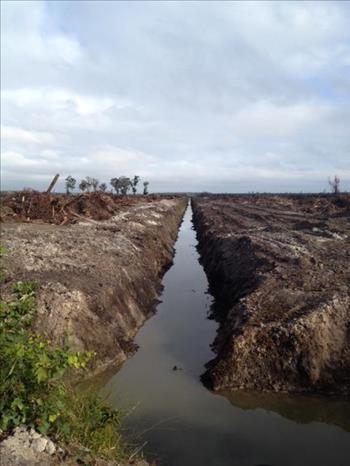First of two parts
Concurrent with a new report that indicates that the loss of coastal wetlands in the United States has accelerated, environmental activists in North Carolina are growing increasingly alarmed about what they see as an erosion of the state’s once-firm commitment to preserve the crucial habitat.
Supporter Spotlight
 John Dorney John Dorney |
North Carolina’s top water-quality official says nothing has changed and that commitment remains firm, but those worried about wetlands point to developments during the first year of Gov. Pat McCrory’s administration that they say seem to indicate otherwise. The state rejected a federal grant meant to strengthen wetlands protections and then announced the eventual abolishment of a key wetlands program. It decided not to review a federal wetlands permit in the western part of the state, as is customary and required under federal law, and determined that no wetlands were being filled in a large land-clearing operation in Pamlico County. Budgets and staff have been cut at the N.C. Department of Environmental and Natural Resources, or DENR, the agency most responsible for protecting wetlands. In an ongoing department reorganization, key staff has been shifted and whole divisions have been abolished or moved to other state departments.
Perhaps even more troubling, some said in recent interviews, is what appears to be a discernible shift in attitude. DENR’s leaders have said they want the department to be more business-friendly. Will the remake lead to a more laissez-faire view of wetlands protection?
“Many of the people, good people, are still there, and on the surface you might not notice that there’s all that much that’s different. But the same level of scrutiny is not being exerted,” said John Dorney, who retired two years ago as head of the Program Development Unit of the N.C. Division of Water Quality.
The division, which had the main state role in wetlands protection, was merged with the Division of Water Resources. Dorney’s old program, which provided technical support for the state’s wetlands policies, will be abolished after its current projects are completed in the next two years.
“It’s basically been hollowed out,” Dorney said of his former employer. “It’s philosophical. There just isn’t as much interest in protecting wetlands and water quality. It’s one of the consequences of the election. Rules are rules, and the rules are still there, of course, but there are always interpretations of the rules, and people can be told how to interpret them, and that makes a difference.”
Supporter Spotlight
Pamlico Land Clearing
 Ditches were cut through a tract in Pamlico County some time in the past to make the swampy land suitable for other uses. Ditches were cut through a tract in Pamlico County some time in the past to make the swampy land suitable for other uses. |
One example that Dorney and others point to is in Pamlico County, where the N.C. Coastal Federation and local farmers and government leaders are pressing to slow down or stop a major land-clearing operation that they fear is damaging wetlands and could lead to serious coastal water quality and habitat degradation.
Spring Creek Farms LLC, which is registered in Illinois, recently bought more than 4,600 acres in the county and this fall cleared about 250 for farming. No permits were required because neither the state nor the Army Corps of Engineers considered the cleared land to be wetlands. The Crops is the federal agency that issues permits to fill or otherwise disturb wetlands. Its representatives visited the Spring Creek site and found the water table not close enough to the surface for the land to be considered wetlands. Locals, however, say the site visit was in the summer when the water table is very low and didn’t give regulators a true picture of the nature of the property.
When asked by a reporter for Coastal Review Online earlier this fall if the state would take another look at the land in a different season, DENR spokeswoman Susan Massengale said the corps was “the lead agency in this” and “if they feel they need to reassess this, they would inform us and we might go out with them.”
That worries Dorney.
“Over the years, the state has had a very effective and efficient relationship with the Corps, and it’s been a real partnership, and it’s actually required under the law,” he said. “But when one of the partners is not as willing, for whatever reason, to hold up its end, and that’s the case with the state right now, it leaves the Corps to pick up the slack. And the Corps has plenty of other responsibilities, and it’s just not certain whether they can pick up that slack. I think the Corps will step up and take as much responsibility as they can, but it’s not easy. If the state isn’t as willing to do the work, then it’s going to suffer.”
Henry Wicker, regulatory chief for the Corps’ Wilmington District Office, said recently that the agency does plan to take another look at the land and that the state “may or may not go with us.”
When asked if the corps had noticed any change in the relationship with North Carolina environmental officials, he said, “I’m not in a position to comment on relationships with the state or other federal agencies. We work with them on a daily basis, and we want to maintain the very best relationship possible.”
When asked more specifically about the Spring Creek Farms property, Wicker said he wasn’t sure whether the state would go on another visit to the land. “The state has its laws and regulations to implement and enforce and we have ours,” he said. “In some cases, they (the state) might not have as much interest in a particular project as we do.”
Wetlands Grant
The state’s rejection of a federal wetlands grant is to Molly Diggins, head of the N.C. chapter of the Sierra Club, another sign of a faltering commitment to protect wetlands. DENR in September turned down almost $360,000 from the U.S. Environmental Protection Agency for wetland monitoring. It turned down another grant – for about $230,000 – to monitor streams in the Piedmont where fracking for natural gas is likely to occur.
 Molly Diggins Molly Diggins |
DENR had submitted the grants earlier in the year and was notified in June that the grants had been approved and that the money would be distributed later in the year. An EPA spokeswoman in Atlanta said it was the first time a state in the agency’s Southeast region had refused a grant. North Carolina may be the first state in the nation to do so.
“Those were unprecedented decisions,” Diggins said. “It would seem to be a pretty clear indication to us that the state just isn’t nearly as interested in wetlands protection as it has been, and that’s very disappointing. We have been a leader, and that no longer is the case.”
The grant would have been used by Dorney’s old Program Development Unit for long-term monitoring of wetlands in the Piedmont and coastal plain. The unit had been mostly funded by these EPA grants, to the tune of about $10 million in the past 20 years.
The unit, said Dorney, was of great importance. It played a key role, for instance, in determining that intermittent streams, which flow in winter but dry up in summer, harbor aquatic life. But perhaps even more important, Dorney said, is that the grants have helped the state stay ahead of the curve on wetlands and water quality science.
“This is really important, but it’s something a lot of people don’t really know about or understand,” he said. “It’s about keeping up with the science. North Carolina has been THE leader in the South, and one of the leaders in the nation. If you don’t do this, and do it well, and do it consistently, then you’re not learning and you’re not improving.”
The Program Development Unit, DENR officials say, will be eliminated after two existing grants are completed in the next couple of years. Its six staffers have been or will be offered new jobs at DENR.
Cleveland County Dam
Another disturbing sign, say Diggins, Dorney and others, is the state’s decision to essentially bow out wetlands permitting for a controversial reservoir proposed in Cleveland County in the foothills of the Blue Ridge Mountains. First proposed in 2000 by a public water utility in the county, the reservoir would dam the First Broad River, potentially destroying more than 20 miles of stream, inundating more than 1,000 acres of forest and farmland and destroying at least six acres of wetland.
Under the federal Clean Water Act, the Corps must approve the project and DENR must certify that the destruction of wetlands won’t compromise water quality. But DENR in July told the county utility that it would waive its certification. All the project then needed was Corps’ approval.
 Tom Reeder Tom Reeder |
 Derb Carter Derb Carter |
The Southern Environmental Law Center, acting on behalf of American Rivers, appealed DENR’s waiver to the state Office of Administrative Hearings.
“This was the first time in anyone’s memory that the state has waived this 401 certification,” said Derb Carter, who heads the law center’s office in Chapel Hill. “We think it is illegal and we have challenged it. There are certain requirements in the regulations, and they are supposed to be followed, and for good reason. The public needs to know that the state is looking out for the public interest, and this review is one of the ways that is done.”
More generally, Carter said, “North Carolina has had a very good wetlands program and good water quality rules for many years. But when you look at the Cleveland County reservoir, the Pamlico County (Spring Creek Farms) issues and other things that have been said and done, it’s becoming very clear that there is very little interest now in protecting wetlands and water quality.
“When the state is not meeting its responsibilities under laws to protect the environment, citizens’ suits for enforcement can be very effective. We are now, and I’m sure we will be doing more, enforcement.”
Tom Reeder, head of the state’s Water Resources Division and a holdover from the administration of Gov. Beverly Perdue, says much is being made of nothing.
“People have made a big deal out of the Cleveland County reservoir and turning down the grant, but it’s very much overblown,” he said. “We are still fairly implementing and enforcing all of the rules. We have not, to my mind, done anything differently than we have done before in terms of enforcing the rules. We have not broken any rules. We have not done anything to harm the environment.”
The state, Reeder said, merely exercised it prerogative under the Clean Water Act to waive the certification for the dam. The Corps, he said, is certain to deny the permit. Getting involved would have merely cost the state time and money for no good purpose, Reeder said.
“Our purpose,” he said, “is to protect public health and the environment for the people of North Carolina and none of these things people say we have done or not done show any lack of dedication or determination to protect wetlands. In fact, I’d like anyone to tell me where anything we have done has had any negative impact on the environment of North Carolina.”
Wednesday: Hofmann Forest and staff cuts







